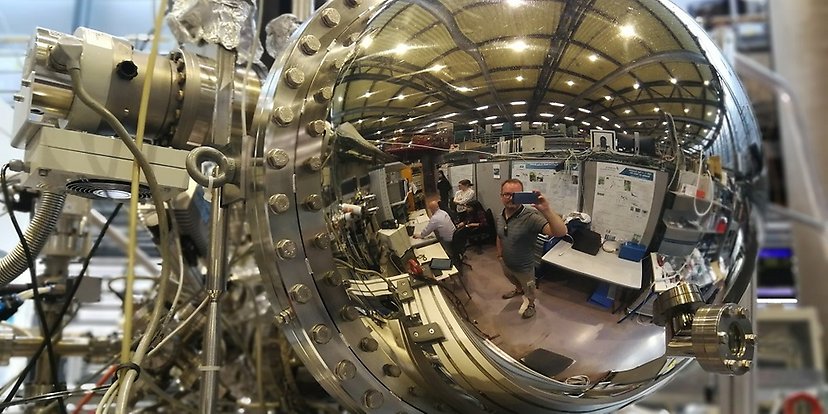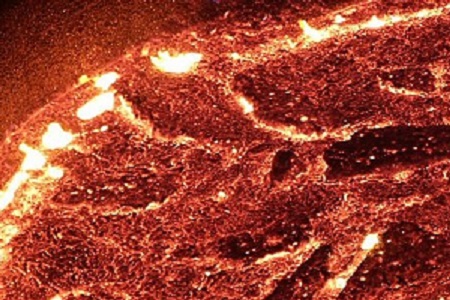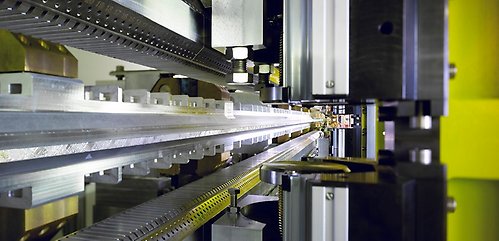Inorganic chemistry

Within the research program for inorganic chemistry, we devote ourselves to studying and synthesizing materials. Our research projects focus on the development of new materials with designed properties.
Our research
Our research is rooted in inorganic chemistry - the study and synthesis of materials. We have a wide range of research projects focused on the development of new materials with designed properties. Our materials are synthesised using high-temperature solid state, solution or vacuum based techniques. The structures developed are as powders, compacts, sponges, and films and coatings. We have also several on-going projects on additive manufacturing (AM) or 3D-printing of alloys and composite materials.
An integral part of materials research and development is materials characterisation, and within our projects we do not only use, but also develop advanced characterisation methods to investigate our materials at different length scales using, for example, x-ray and neutron diffraction, imaging electron microscopy, x-ray spectroscopy and various electrochemical techniques. This is done using both local and large-scale research infrastructure.
Our research profile is focused on two major research themes: new materials for harsh environments and sustainable development and energy. In both these areas, control and fundamental understanding of the chemistry is of paramount importance.
Research themes
Method development
Harsh environments
There is need for new materials which can withstand very corrosive environments or high temperatures without oxidation or detrimental phase transformations. In many applications materials are exposed to high loads, stresses, erosion, radiation etc which can destroy or seriously damage the material. There is also a need for new materials which exhibit functional properties also at harsh conditions. This includes, for example, sensor materials and catalysts.

Sustainable development
A more sustainable society that uses renewable energy also requires the development of new materials. Materials that give better performance and with better possibilities to store energy. It is also important to find alternatives to the critical elements and rare earth metals that are currently used in the technology that is important for the transition to a fossil-free society.

Methods we use in our research
Additive manufacturing
Additive manufacturing (AM) or 3D printing is a rapidly growing technology for producing components for various applications. AM can be used to produce components that are more suitable for harsh environments or for a more sustainable society.

Advanced material analysis
An important part of material research is the ability to characterize materials and determine crystal structure, chemical composition and microstructure. All our projects involve qualified material characterization.

Publications
Magnetic property changes of NdGa upon hydrogen absorption
Part of Physical Review B, 2024
- DOI for Magnetic property changes of NdGa upon hydrogen absorption
- Download full text (pdf) of Magnetic property changes of NdGa upon hydrogen absorption
Proton irradiation-induced cracking and microstructural defects in UN and (U,Zr)N composite fuels
Part of Journal of Materiomics, p. 906-918, 2024
- DOI for Proton irradiation-induced cracking and microstructural defects in UN and (U,Zr)N composite fuels
- Download full text (pdf) of Proton irradiation-induced cracking and microstructural defects in UN and (U,Zr)N composite fuels
Phase Stability and Magnetic Properties of Compositionally Complex n=2 Ruddlesden-Popper Perovskites
Part of Inorganic Chemistry, p. 6616-6625, 2024
- DOI for Phase Stability and Magnetic Properties of Compositionally Complex n=2 Ruddlesden-Popper Perovskites
- Download full text (pdf) of Phase Stability and Magnetic Properties of Compositionally Complex n=2 Ruddlesden-Popper Perovskites
Anodic dissolution of aluminum in non-aqueous electrolyte solutions for sodium-ion batteries
Part of Energy Advances, p. 143-148, 2024
- DOI for Anodic dissolution of aluminum in non-aqueous electrolyte solutions for sodium-ion batteries
- Download full text (pdf) of Anodic dissolution of aluminum in non-aqueous electrolyte solutions for sodium-ion batteries
Part of Surface & Coatings Technology, 2024
- DOI for Elemental distribution and fracture properties of magnetron sputtered carbon supersaturated tungsten films
- Download full text (pdf) of Elemental distribution and fracture properties of magnetron sputtered carbon supersaturated tungsten films
Part of Advanced Science, 2024
- DOI for Fundamental Understanding and Quantification of Capacity Losses Involving the Negative Electrode in Sodium-Ion Batteries
- Download full text (pdf) of Fundamental Understanding and Quantification of Capacity Losses Involving the Negative Electrode in Sodium-Ion Batteries
Structural and mechanical properties of magnetron sputtered (NbxMo1-x)C thin films
Part of Vacuum, 2024
- DOI for Structural and mechanical properties of magnetron sputtered (NbxMo1-x)C thin films
- Download full text (pdf) of Structural and mechanical properties of magnetron sputtered (NbxMo1-x)C thin films
Spin glass states in multicomponent layered perovskites
Part of Scientific Reports, 2024
- DOI for Spin glass states in multicomponent layered perovskites
- Download full text (pdf) of Spin glass states in multicomponent layered perovskites
Part of Journal of Alloys and Compounds, 2024
- DOI for Intermetallics of 4:4:1 and 3:3:1 series in La-(Co,Ni)-M (M = Bi, Pb, Te, Sb, Sn and Ga, Al) systems and their properties
- Download full text (pdf) of Intermetallics of 4:4:1 and 3:3:1 series in La-(Co,Ni)-M (M = Bi, Pb, Te, Sb, Sn and Ga, Al) systems and their properties
Near-surface analysis of magnetron sputtered AlCrNbYZrNx high entropy materials resolved by HAXPES
Part of Applied Surface Science, 2024
Part of ChemSusChem, p. 1-11, 2024
Crack reduction in laser powder bed fusion of MnAl(C) using graphene oxide coated powders
Part of Scientific Reports, 2024
- DOI for Crack reduction in laser powder bed fusion of MnAl(C) using graphene oxide coated powders
- Download full text (pdf) of Crack reduction in laser powder bed fusion of MnAl(C) using graphene oxide coated powders
CoTeO4: a wide-bandgap material adopting the dirutile structure type
Part of Materials Advances, p. 3001-3013, 2024
- DOI for CoTeO4: a wide-bandgap material adopting the dirutile structure type
- Download full text (pdf) of CoTeO4: a wide-bandgap material adopting the dirutile structure type
N-2 adsorption on high-entropy alloy surfaces: unveiling the role of local environments
Part of Journal of Materials Chemistry A, p. 12973-12983, 2023
- DOI for N-2 adsorption on high-entropy alloy surfaces: unveiling the role of local environments
- Download full text (pdf) of N-2 adsorption on high-entropy alloy surfaces: unveiling the role of local environments
Part of Proceedings of the National Academy of Sciences of the United States of America, 2023
- DOI for Biodegradable lipophilic polymeric mRNA nanoparticles for ligand-free targeting of splenic dendritic cells for cancer vaccination
- Download full text (pdf) of Biodegradable lipophilic polymeric mRNA nanoparticles for ligand-free targeting of splenic dendritic cells for cancer vaccination
Single-electron transfer reactions on surface-modified gold plasmons
Part of Materials Today Chemistry, 2023
- DOI for Single-electron transfer reactions on surface-modified gold plasmons
- Download full text (pdf) of Single-electron transfer reactions on surface-modified gold plasmons
Effect of magnetic disorder on Cr interaction with 1/2 < 111 > screw dislocations in bcc iron
Part of Journal of Applied Physics, 2023
- DOI for Effect of magnetic disorder on Cr interaction with 1/2 < 111 > screw dislocations in bcc iron
- Download full text (pdf) of Effect of magnetic disorder on Cr interaction with 1/2 < 111 > screw dislocations in bcc iron
Part of ACTA CRYSTALLOGRAPHICA SECTION E-STRUCTURE REPORTS ONLINE, p. 267-171, 2023
- DOI for Syntheses and crystal structures of three novel oxalate coordination compounds: Rb2Co(C2O4) 2 similar to 4H2O, Rb2CoCl2(C2O4) and K2Li2Cu(C2O4) (3 similar to)2H(2)O
- Download full text (pdf) of Syntheses and crystal structures of three novel oxalate coordination compounds: Rb2Co(C2O4) 2 similar to 4H2O, Rb2CoCl2(C2O4) and K2Li2Cu(C2O4) (3 similar to)2H(2)O
Part of Applied Surface Science, 2023
Site-specific atomic substitution in a giant magnetocaloric Fe2P-type system
Part of Physical Review B, 2023
- DOI for Site-specific atomic substitution in a giant magnetocaloric Fe2P-type system
- Download full text (pdf) of Site-specific atomic substitution in a giant magnetocaloric Fe2P-type system
Convective Flow Redistribution of Oxygen by Laser Melting of a Zr-Based Amorphous Alloy
Part of Materials, 2023
- DOI for Convective Flow Redistribution of Oxygen by Laser Melting of a Zr-Based Amorphous Alloy
- Download full text (pdf) of Convective Flow Redistribution of Oxygen by Laser Melting of a Zr-Based Amorphous Alloy
X-ray photoelectron spectroscopy of thin films
Part of NATURE REVIEWS METHODS PRIMERS, 2023
Lan(n+1)+xNin(n+5)+ySi(n+1)(n+2)–z: A Symmetric Mirror Homologous Series in the La-Ni-Si System
Part of Inorganic Chemistry, p. 10736-10742, 2023
- DOI for Lan(n+1)+xNin(n+5)+ySi(n+1)(n+2)–z: A Symmetric Mirror Homologous Series in the La-Ni-Si System
- Download full text (pdf) of Lan(n+1)+xNin(n+5)+ySi(n+1)(n+2)–z: A Symmetric Mirror Homologous Series in the La-Ni-Si System
WC-Ni cemented carbides prepared from Ni nano-dot coated powders
Part of International journal of refractory metals & hard materials, 2023
- DOI for WC-Ni cemented carbides prepared from Ni nano-dot coated powders
- Download full text (pdf) of WC-Ni cemented carbides prepared from Ni nano-dot coated powders
Magnetic carbon nanocomposites via the graphitization of glucose and their induction heating
Part of Journal of Alloys and Compounds, 2023
- DOI for Magnetic carbon nanocomposites via the graphitization of glucose and their induction heating
- Download full text (pdf) of Magnetic carbon nanocomposites via the graphitization of glucose and their induction heating
Influence of Mn content on the magnetic properties of the hexagonal Mn (Co,Ge)2 phase
Part of Scripta Materialia, 2023
- DOI for Influence of Mn content on the magnetic properties of the hexagonal Mn (Co,Ge)2 phase
- Download full text (pdf) of Influence of Mn content on the magnetic properties of the hexagonal Mn (Co,Ge)2 phase
Part of ChemElectroChem, 2023
- DOI for Photovoltaic Wafering Silicon Kerf Loss as Raw Material: Example of Negative Electrode for Lithium‐Ion Battery
- Download full text (pdf) of Photovoltaic Wafering Silicon Kerf Loss as Raw Material: Example of Negative Electrode for Lithium‐Ion Battery
Part of Small, 2023
- DOI for Influence of Lithium Diffusion into Copper Current Collectors on Lithium Electrodeposition in Anode‐Free Lithium‐Metal Batteries
- Download full text (pdf) of Influence of Lithium Diffusion into Copper Current Collectors on Lithium Electrodeposition in Anode‐Free Lithium‐Metal Batteries
Part of Surface & Coatings Technology, 2023
Entrapped Molecule-Like Europium-Oxide Clusters in Zinc Oxide with Nearly Unaffected Host Structure
Part of Small, 2023
- DOI for Entrapped Molecule-Like Europium-Oxide Clusters in Zinc Oxide with Nearly Unaffected Host Structure
- Download full text (pdf) of Entrapped Molecule-Like Europium-Oxide Clusters in Zinc Oxide with Nearly Unaffected Host Structure
Part of Chemical Engineering Science, 2023
- DOI for Revisiting the stability of aluminum current collectors in carbonate electrolytes for High-Voltage Li-ion batteries
- Download full text (pdf) of Revisiting the stability of aluminum current collectors in carbonate electrolytes for High-Voltage Li-ion batteries
Implementation of time of flight polarized neutron imaging at IMAT-ISIS
Part of Materials & design, 2023
- DOI for Implementation of time of flight polarized neutron imaging at IMAT-ISIS
- Download full text (pdf) of Implementation of time of flight polarized neutron imaging at IMAT-ISIS
Additive Manufacturing of MnAl(C)-Magnets
Part of Alloys, p. 100-109, 2023
Anomalous Electron-Phonon Coupling in Cesium-Substituted Methylammonium Lead Iodide Perovskites
Part of The Journal of Physical Chemistry C, p. 22817-22826, 2023
Part of Acta Materialia, 2023
- DOI for From high-entropy alloys to high-entropy ceramics: The radiation-resistant highly concentrated refractory carbide (CrNbTaTiW)C
- Download full text (pdf) of From high-entropy alloys to high-entropy ceramics: The radiation-resistant highly concentrated refractory carbide (CrNbTaTiW)C
Boron Nitride-Graphene (BN-G) Bilayer as a Channel of Graphene Based Field Effect Transistor
Part of ECS Journal of Solid State Science and Technology, 2023
Towards Pareto optimal high entropy hydrides via data-driven materials discovery
Part of Journal of Materials Chemistry A, p. 15878-15888, 2023
Magnetron sputtered high entropy alloy/amorphous carbon nanocomposite coatings
Part of Materials Today Communications, 2023
- DOI for Magnetron sputtered high entropy alloy/amorphous carbon nanocomposite coatings
- Download full text (pdf) of Magnetron sputtered high entropy alloy/amorphous carbon nanocomposite coatings
Extending the Passive Region of CrFeNi-Based High Entropy Alloys
Part of Advanced Functional Materials, 2023
- DOI for Extending the Passive Region of CrFeNi-Based High Entropy Alloys
- Download full text (pdf) of Extending the Passive Region of CrFeNi-Based High Entropy Alloys
Deposition of Ga2O3 thin films by liquid metal target sputtering
Part of Vacuum, 2023
Part of Crystal Growth & Design, p. 7680-7687, 2023
- DOI for Exploring Crystallization Phenomena in Al2TiO5-Based Chemical Vapor-Deposited Coatings by in Situ Transmission Electron Microscopy
- Download full text (pdf) of Exploring Crystallization Phenomena in Al2TiO5-Based Chemical Vapor-Deposited Coatings by in Situ Transmission Electron Microscopy
Part of The Journal of Physical Chemistry C, p. 6456-6465, 2023
- DOI for Role of Oxygen in Vacancy-Induced Phase Formation and Crystallization of Al2TiO5-Based Chemical Vapor-Deposited Coatings
- Download full text (pdf) of Role of Oxygen in Vacancy-Induced Phase Formation and Crystallization of Al2TiO5-Based Chemical Vapor-Deposited Coatings
Part of Journal of Materials Chemistry A, p. 12079-12091, 2022
- DOI for Scalable and thermally-integrated solar water-splitting modules using Ag-doped Cu(In,Ga)Se-2 and NiFe layered double hydroxide nanocatalysts
- Download full text (pdf) of Scalable and thermally-integrated solar water-splitting modules using Ag-doped Cu(In,Ga)Se-2 and NiFe layered double hydroxide nanocatalysts
Dynamic dimer copper coordination redox shuttles
Part of Chem, p. 439-449, 2022
Tuning skyrmions in B20 compounds by 4d and 5d doping
Part of Physical Review Materials, 2022
- DOI for Tuning skyrmions in B20 compounds by 4d and 5d doping
- Download full text (pdf) of Tuning skyrmions in B20 compounds by 4d and 5d doping
Octahedral tilting in Prussian blue analogues
Part of Journal of Materials Chemistry C, p. 13690-13699, 2022
- DOI for Octahedral tilting in Prussian blue analogues
- Download full text (pdf) of Octahedral tilting in Prussian blue analogues
Early dynamics of the emission of solvated electrons from nanodiamonds in water
Part of Nanoscale, p. 17188-17195, 2022
- DOI for Early dynamics of the emission of solvated electrons from nanodiamonds in water
- Download full text (pdf) of Early dynamics of the emission of solvated electrons from nanodiamonds in water
Part of Journal of Vacuum Science & Technology. A. Vacuum, Surfaces, and Films, 2022
- DOI for On the growth kinetics, texture, microstructure, and mechanical properties of tungsten carbonitride deposited by chemical vapor deposition
- Download full text (pdf) of On the growth kinetics, texture, microstructure, and mechanical properties of tungsten carbonitride deposited by chemical vapor deposition
Part of Metallurgical and Materials Transactions. A, p. 3073-3082, 2022
- DOI for Precipitation Kinetics During Post-heat Treatment of an Additively Manufactured Ferritic Stainless Steel
- Download full text (pdf) of Precipitation Kinetics During Post-heat Treatment of an Additively Manufactured Ferritic Stainless Steel
Magnetic and Structural Properties of the Fe5Si1-xGexB2 System
Part of Journal of Solid State Chemistry, 2022
- DOI for Magnetic and Structural Properties of the Fe5Si1-xGexB2 System
- Download full text (pdf) of Magnetic and Structural Properties of the Fe5Si1-xGexB2 System
Contact
- If you have questions about our research, you are welcome to contact the programme professor Professor Martin Sahlberg.
- Martin Sahlberg

